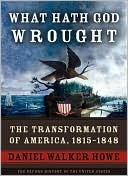Polk conceived of the Pacific Coast empire he had achieved not as an escape into a romanticized Arcadia of subsistence family farms, but as an opening for American enterprise into new avenues of “the commercial world.” For all his supporters’ talk of manifest destiny, Polk had not trusted in an inevitable destiny to expand westward, but, anxious about national security and the danger of British preemption in particular, and prompted by the conviction that the American political, social, and economic order required continual room for physical expansion, he had hastily confronted both the Oregon
...more
Welcome back. Just a moment while we sign you in to your Goodreads account.


